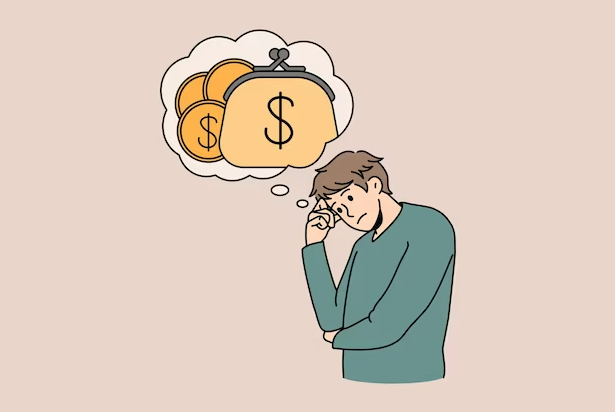
With the colder months approaching, so are the increased heating bills. Along with the cost-of-living crisis still being in full swing, many people are feeling the stress. In this guide we will explain how you can reduce financial stress so you can put your energy towards something more important.
The first steps towards being able to reduce financial stress is recognising it. Facing money struggles can really impact someone psychologically and emotionally. Financial stress is sadly common, affecting millions of people, and it can show up in different ways:

Money issues are often out of our personal control – the economy sinks, you lose your job, medical crises happen. It’s key to remember you aren’t alone in this.
Even though financial stress feels personal, it doesn’t say anything about your value or worthiness as a human. But if prolonged, it can seriously impact your mental and physical well-being. Recognising symptoms allows you to get a handle on it.
Common emotional reactions when you’re in the gutter financially:
Being real with yourself about these feelings is healthy though. It’s totally normal to feel all kinds of emotions when life throws you curveballs. Focus on what you can control, make a plan to move forward, and don’t be scared to ask for help. With time and effort, you can get through the hard stuff. For more information on how you can get help for financial stress visit the NHS website.
The first step to reduce financial stress is to thoroughly review your complete money situation so you really understand where you stand currently. Take stock of all your expenses, debts, assets, and income sources.

Getting the full financial picture allows you to start finding areas to lower spending and raise income. Look at discretionary expenses you can temporarily reduce – cable packages, gym memberships, entertainment budget. Avoid sacrificing essential needs like food, shelter, transportation.
Ask yourself:
Having accurate info motivates you to make helpful money moves. And it prevents exaggerating worst-case scenarios in your head that lead to panic. You’ll know exactly what needs to be done to start reducing your financial stress.
Once you understand your full financial situation, it’s vital to make and follow a realistic budget that aligns with your current circumstances.
Budgeting helps you align your priorities, spend mindfully, and avoid accumulating further debt when money is tight. The 50/30/20 budget is an effective approach:

Steps to creating your budget:
Having a budget provides clarity and a feeling of control during difficult times and with dealing with financial stress. But you must continually reference it and stick to it. If you have a partner, budget together. Hold each other accountable. You can make use of apps such as Monzo and Mint which automatically show you how much you are spending on each expense.
When financial struggles hit, it’s easy to avoid facing multiple debts head on. But you’ll feel empowered by getting organised and making a plan.
Start by listing all outstanding debts by:
Rank your debts from highest interest rate to lowest. Pay the minimum on all debts each month, then put any extra funds towards the highest interest debt first.

Strategies like debt avalanche (paying high-interest debt first) and debt snowball (paying smallest balance first) can motivate you. If you have multiple creditors calling, explain your situation calmly and try to reduce or defer payments if possible. Avoid ignoring them, as this will worsen stress.
Once you pay off the first account, take its minimum payment and apply it to the next account. This debt payoff momentum keeps you motivated. Automate payments to avoid late fees. If you have a partner, communicate with them before making adjustments.
Getting a visual, logical plan for repayment makes the path forward clearer when dealing with overwhelming debt. You got this!
When you’re experiencing financial stress and hardship, speaking directly with your creditors can help relieve some stress of debt obligations.
Contact each creditor – credit card companies, medical providers, banks, etc. Explain your current situation and desire to pay, but inability to pay the full amount currently owed each month.
Ask if they can:

Come prepared with the payment plan you can manage based on your budget. Most creditors would prefer to recoup some money each month than none at all.
If certain medical or credit card debt is insurmountable, ask about debt consolidation or settlement offers. This reduces the total balance owed in exchange for consistent payments.
While uncomfortable, directly communicating with creditors often leads to mutually beneficial arrangements during financial turmoil. Debt collectors typically escalate aggressive tactics when you avoid them. As long as you demonstrate good faith effort, most creditors will work with you.
Once you pay off the first account, take its minimum payment and apply it to the next account. This debt payoff momentum keeps you motivated. Automate payments to avoid late fees. If you have a partner, communicate with them before making adjustments.
Getting a visual, logical plan for repayment makes the path to reduce financial stress clearer when dealing with overwhelming debt. You got this!
During financial hardship, be sure to explore any government, nonprofit, or community assistance programmes available. Even small amounts of aid can provide some relief.
Options to research include:
Check the government website to see what benefits you could be entitled to. Take advantage of every potential source of aid available.
Money struggles can put a damper on recreation and entertainment. But resting and relaxing are crucial for your mental health when dealing with financial stress.
Seek out fulfilling activities that won’t strain your limited budget:

Fill your time with simple, refreshing activities that relieve stress, broaden your skills, and bring you joy. Don’t isolate yourself due to lack of funds. Connection and creativity empower you.
Money struggles can feel lonely and isolating. But surrounding yourself with a strong support system is vital during financial hardship.
Reach out to close friends and family you trust. Vent about your frustrations, look for reassurance, and ask loved ones to hold you accountable with budgeting and other positive changes.
Connect with others going through similar challenges by joining a support group through your church, community centre, or organizations like Debtors Anonymous. Share your story, offer encouragement, and gain perspective from people who understand firsthand.
If you are single parent, find local single parent support groups. For older adults facing financial insecurity, groups like Age UK provide education and companionship. And for those dealing with job loss, unemployment resource centres help with the transition.
Don’t let pride, shame, or embarrassment prevent you from seeking support. We all need help sometimes. Let loved ones remind you of your intrinsic worth beyond your bank account.
Financial struggles understandably cause high stress. But allowing that stress to become chronic and all-consuming will only harm your mental and physical health.
Make time every day to reset and relieve stress using healthy coping techniques:

Don’t neglect self-care. Allocating time for stress relief will ultimately make you more focused, motivated, and resilient. Practicing general stress relief techniques can in turn help reduce financial stress.
The uncertainty of financial stress and hardship can feel overwhelming. But reframing your mindset helps build resilience.
Focus your energy on the aspects of your situation that you have control over:
Letting go of the factors outside your control – the economy, job market, interest rates, political landscape. No amount of worrying will change these things. Redirect that energy towards what you can change. Reduce financial stress by thinking about it less.
Also make peace with feeling a range of emotions – fear, frustration, sadness. Don’t judge your feelings or let them define you. Stay grounded in the present moment.

With time, effort, and support you can regain stability. Have faith in your ability to handle challenges and come through stronger. Progress may feel slow, but perseverance pays off. By putting the tips and guidance we have given you, you should be able to reduce financial stress in your life.
Below we have included a list of debt charities that could be of use to you if you need further support:
If you are are Self-Employed, Umbrella or Limited Company you can reduce financial stress and get peace of mind when it comes to taxes. Get in touch with us and find out more here.
